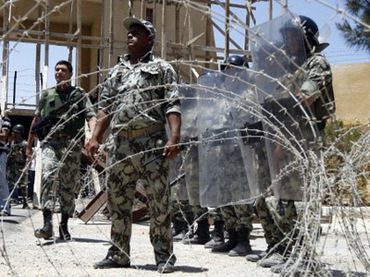NEW YORK: Bishop Richard Williamson has some very peculiar, and frankly odious, views: that no Jews were murdered in gas chambers during World War II; that the Twin Towers were brought down by American explosives, not by airplanes, on September 11, 2001; and that Jews are fighting to dominate the world “to prepare the anti-Christ’s throne in Jerusalem. And these are just some of his opinions on secular matters.
On questions of Roman Catholic doctrine, his views were considered so out of line with the modern Church that the Vatican excommunicated him in 1988, along with other members of the ultra-conservative Society of St. Pius X, founded by the fascist sympathizer Marcel Lefebvre. Supporters of Williamson include the British historian David Irving, who was recently jailed in Austria for glorifying the Nazis.
The bishop, then, does not strike one as an attractive man. But does he deserve everything now hanging over his head? As a consequence of the views he expressed on Swedish television, he was denied re-entry into the Church, as was promised earlier by Pope Benedict, which is probably just as well. But he was also kicked out of Argentina, where he lived, and is threatened with extradition to Germany, where preparations are made to prosecute him for Holocaust denial.
Meanwhile, consider the case of another unappealing man, the Dutch politician Geert Wilders, who was banned last month from entering the United Kingdom, where he had planned to show his short film, entitled Fitna, which describes Islam as a terrorist faith. Back in Holland, a case is being made against him in an Amsterdam court for “spreading hatred against Muslims. He has compared the Quran to Hitler’s Mein Kampf, and wishes to stop immigration of Muslims to the Netherlands.
The British ban, as well as the impending court case, has actually made Wilders more popular in the Netherlands, where one poll indicated that his populist anti-Muslim party, the PVV, would get 27 seats in parliament if elections were held today. The reason for Wilders’ surging popularity, apart from widespread distrust of Muslims, is that he has successfully cultivated an image as a fighter for free speech.
The principle of free speech, one of the fundamental rights in liberal democracies, means that we must live with views that we find reprehensible, up to a point. The question is, up to what point?
Laws on free speech differ somewhat from country to country. It is a criminal offense in various European democracies, including France, Germany, and Austria, to express the view that the Holocaust never happened. Many democratic countries also have laws against inciting violence or hatred. Some countries, including the Netherlands, even have laws against deliberately insulting people on the grounds of their race or religion.
Bishop Williamson’s ideas may be loathsome, but criminal prosecution against a man for his views about history is probably a bad idea. He should be criticized, even ridiculed, but not jailed. Similarly, it would have been much better to let Wilders show his wretched film in Britain than to ban him.
Whatever one thinks of laws against spreading hatred or insulting people, the law remains a blunt instrument when it came to matters of speech.
Nevertheless, free speech is not absolute. Even Wilders, with his absurd call to ban the Quran, clearly believes that there are limits – for his opponents, of course, not for himself. But it is not so easy to define precisely what those limits should be, for they depend on who says what to whom, and even where.
Williamson’s opinions suddenly mattered, because this obscure, excommunicated priest was about to be reinstated by the Pope. This would have given institutional legitimacy to his private views. In the case of Wilders, it makes a difference that he is a politician, not just a private individual, pandering to dangerous prejudices against a vulnerable minority.
In civilized life, people refrain from saying many things, regardless of questions of legality. Words used by young black men among themselves in American cities would have a very different resonance if young white men used them. Mocking the ways and beliefs of minorities is not quite the same thing as taking on the cherished habits and views of majorities.
If this smacks of political correctness, then so be it. But civilized life, especially in countries with great ethnic and religious diversity, would soon break down if everyone felt free to say anything they liked to anyone. The problem is where to draw the line. Legally, this should probably be the point where words are designed to result in violence. Socially, there are too many variables to establish an absolute, universal principle. The proper limits must be constantly tested, contested, and renegotiated.
People like Bishop Williamson and Geert Wilders are useful to the extent that they allow us to do just that. Let them speak, so that they can be judged, not in court, but by contrary opinions. Banning them only allows them to pose as martyrs to free speech. And that not only makes it harder to attack their views, but also gives free speech a bad name.
Ian Buruma’s latest book is The China Lover. This comment is published by DAILY NEWS EGYPT in collaboration with Project Syndicate (www.project-syndicate.org).
